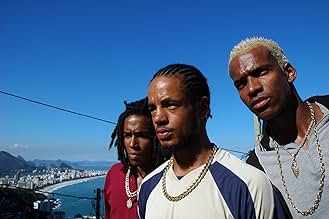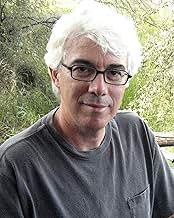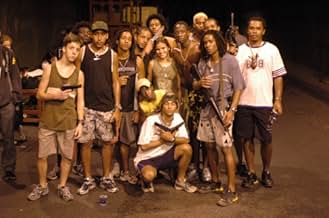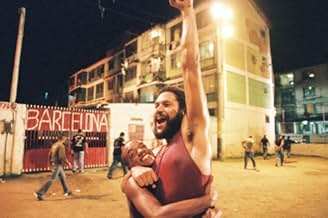IMDb रेटिंग
7.2/10
17 हज़ार
आपकी रेटिंग
अपनी भाषा में प्लॉट जोड़ेंBest buddies Acerola and Laranjinha, about to turn 18, discover things about their missing fathers' pasts which will shatter their solid friendship, in the middle of a war between rival drug... सभी पढ़ेंBest buddies Acerola and Laranjinha, about to turn 18, discover things about their missing fathers' pasts which will shatter their solid friendship, in the middle of a war between rival drug gangs from Rio's favelas.Best buddies Acerola and Laranjinha, about to turn 18, discover things about their missing fathers' pasts which will shatter their solid friendship, in the middle of a war between rival drug gangs from Rio's favelas.
- पुरस्कार
- 14 कुल नामांकन
Naima Silva
- Camila
- (as Naíma Silva)
Eduardo 'BR' Piranha
- Nefasto
- (as Eduardo BR)
फ़ीचर्ड समीक्षाएं
In the slum in Morro da Sinuca, a couple of days before turning eighteen year-old, Laranjinha (Darlan Cunha) tells his best friend and also orphan Acerola (Douglas Silva) that he misses his unknown father. Acerola decides to help his needy friend to find his father and they discover that he is in prison convicted for killing a man during a robbery and near to be released on parole. Meanwhile, Acerola's wife and babysitter Cris (Camila Monteiro) is invited to work in São Paulo and she sees the chance to raise money to buy a house of her own; she tells Acerola that he must take care of their son Clayton alone for one year. When the owner of the hill and Laranjinha's cousin Madrugadão (Jonathan Haagensen) is betrayed by his right-hand Nefasto (Eduardo BR), he is expelled from the slum and Laranjinha and Acerola have also to leave the hill. While Madrugadão plots a plan to invade and recover the hill with the support of the gang of the drug lord from Morro do Careca, Acerola and Laranjinha unravel the past of their fathers.
"Cidade dos Homens" follows the success of "Cidade de Deus" showing the life in one of the slums of Rio de Janeiro through the personal drama of the two lead teenagers, having as background the war between the rival gangs. The story is very realistic and the cast is amazingly natural in their performances, therefore the work of the writers and the director Paulo Morelli are awesome. The cinematography is also top-notch, with landscapes from the hill and well-choreographed and impressive action scenes in the slum. The producers certainly have an agreement with the real drug lords and owner of the hill to shoot this great movie. My vote is eight.
Title (Brazil): "Cidade dos Homens" ("City of the Men")
"Cidade dos Homens" follows the success of "Cidade de Deus" showing the life in one of the slums of Rio de Janeiro through the personal drama of the two lead teenagers, having as background the war between the rival gangs. The story is very realistic and the cast is amazingly natural in their performances, therefore the work of the writers and the director Paulo Morelli are awesome. The cinematography is also top-notch, with landscapes from the hill and well-choreographed and impressive action scenes in the slum. The producers certainly have an agreement with the real drug lords and owner of the hill to shoot this great movie. My vote is eight.
Title (Brazil): "Cidade dos Homens" ("City of the Men")
The film City of Men is a fantastic Brazilian film. It's directed by the same creator of City of God and the City of Men TV series. Now, personally, I recommend you watch the TV series before watching the movie due to many flashbacks throughout the film. The TV series also adds more depth to the characters that add to the overall enjoyment of the film. The film is still set in the favelas in Rio, but instead of focusing on the gangs as in City of God, it focuses on two 18 year old boys. The film is similar to City of God, but with a more light-hearted feel to it. The film also has similar cinematography. Overall, I prefer City of God to this film, but it is a worthy follow up to a fantastic film. 9 stars out of 10 in relation to City of God, but as a film in general, compared to the majority of films created this would deserve 10 stars.
Director Fernando Meirelles' Brazilian gang warfare epic "City of God" made its mark in cinematic history as the premier film on depicting the horrors of drug trafficking & gang violence in Rio, Brazil's favelas. So why not a "city pass" on a sequel? A few years after the "City of God" fame, Meirelles and other collaborators including Director Paulo Morelli decided to produce a Brazilian TV episodic series entitled "City of Men" on the same premise. They casted young Brazilian actors Douglas Silva and Darlan Cunha as two charismatic best friends living their lives in spite of all the gang warfare that surrounds them in Rio's favelas. The series was a success, and the time to hit the silver screen came calling to the story of "City of Men". Even though "City of Men" does not involve the same characters of "City of God", it still does incorporate the same themes of it predecessor including: friendship, loyalty, drugs, poverty, violence, and survival. However, the overlying theme of "City of God" was drug trafficking with all the aforementioned as background themes. While the forefront of "City of Men" is the young protagonists' quest to find their unknown fathers with all the aforementioned also incorporated as background themes. "City of Men" does not excel in masterful storytelling and character development as "City of God" but it does hit the mark on the survival fortitude of its main protagonists. Meirelles only served as producer this time around and wisely transplanted the talents of Director Morelli and stars Silva & Cunha to the big screen adaptation. All of them hit the mark with their efforts. Even though many of the themes are terrifying and at sporadic times disturbing to look at, "City of Men" continues to keep it rio on the realities of a drug & gang induced life in Rio's favelas. **** Good
I just saw it and despite of the rough theme is a sensitive and emotive movie, very different from City of God. City of God was frenetic, full of effects, City of Men is more traditional and the narrative is more conventional. The traffic and the violence is in the background, the theme here is the paternity. Acting is first class, music is melodious and integrate to the scenes, photograph is similar to City of God. Above the summary: Laranjinha and Acerola are preparing themselves to adult life! At the age of 18, each boy has his own problems: Child, women, family, job, forgotten wishes and dreams are some of this adventure's spices, which, to add another pinch of thrill, tells about a war on the hill that will expel the young adults from their community. Will be definite all those changes?
Following the cult Brazilian TV series "City of Men" (2002-2005), Acerola (Douglas Silva) and Laranjinha (Darlan Cunha), two orphaned, teenage street kids living in Morro da Sinuca (one of Rio's 800+ favelas), are now about to turn eighteen and face the issues of adulthood. Fatherhood -- in a social milieu where most kids grow up fatherless -- is the key theme here: Acerola is now a teen dad who has to take care of his baby boy when his teen wife moves to São Paulo to work as a babysitter; and Laranjinha is on the search of the identity of his unknown father, only to discover he's alive and is an ex-convict on parole. On the background, the violent, destitute, lawless, drug-gang controlled life in Rio's favelas.
A sort of mix of Fernando Meirelles' (co-producer here) "City of God" in visual style and "Oliver Twist" in spirit, one of the major problems of "City of Men" is its contrived plot solutions: we have to deal with Acerola's impossibly fast finding of Laranjinha's father whereabouts. And Acerola's grandmother ending up homeless and abandoned by her family (in the film's phoniest solution). And trafficker Nefasto suddenly changing sides in the gang war; and Acerola's one-chance-in-a-million spotting trafficker Fiel still alive, and the phony solution linking Acerola's and Laranjinha's fathers in the past, etc.
Director Paulo Morelli -- who made the practically unseen "Preço da Paz" and the insipid "Viva Voz", and directed some episodes of the "City of Men" TV series -- comes from the publicity world, and it certainly shows. His images are (too) soigné: the black bodies have a golden shine, with pearly sweat drops and blazingly white teeth. He adopts cinéma-vérité style (in the camera-work, dialog, performances), now de rigueur in films dealing with "stark realities". Oscar-nominated editor Daniel Rezende ("City of God", "Motorcycle Diaries") tries to keep things moving fast so we don't have time to think about plot holes and contrivances. Antonio Pinto's music is beautiful but inexplicably old-fashioned for a movie about teenagers. On a positive note, the sound design and effects are superb.
The cast -- most of them from the TV series -- is asked to do more of the same. Douglas Silva (Acerola) relies on his intuitive acting and his big, expressive fish face. Jonathan Haagensen (as drug lord Madrugadão) again acts with his pout and bare torso in his usual laid back bad-boy style, looking suitably stoned. Babu Santana does his usual scenery-chewing in a bit as a trafficker. Camila Monteiro, Luciano Vidigal (a sensitive actor with an impossible part) and others repeat their TV roles. Eduardo BR as Nefasto suggests a blooming talent; Rodrigo dos Santos as Laranjinha's father has a great movie face, and first-timers Pedro Henrique (Caju) and Naíma Silva (Camila) are sensitively directed. The best is Darlan Cunha as Laranjinha: no-nonsense, nonplussed, witty and resourceful, his deadpan acting is the essence of the "carioca cool".
But there's something bothersome about "Cidade dos Homens": it's hard to concentrate on Acerola's sex troubles or Laranjinha's unlikely instant attachment to his shady father (are Rio's street kids really this naive?) when characters like Caju (the dim-witted, glamor-seeking teenager who joins the drug gang) or those really original characters -- the teenage girls that have "upgraded" from "gangsta molls" to becoming gangstas themselves -- screamed for attention and development. The fact is it's weird to take "City of Men" for its face value, i.e. a buddy-buddy movie with the favela drug war on the background, though we all know ordinary life somehow always goes on even in the most violent, crude realities.
By focusing on the personal problems of Acerola and Laranjinha, director Morelli and writer Elena Soárez ("House of Sand", "Eu Tu Eles", lending a sensitive touch to what could have been a stolid buddy movie) choose to concentrate on plot and characters, using a lot of big close-ups of the kids' faces so we won't be distracted by the hellish favela background -- and yet the "background" jumps right on our laps. Poverty, segregation, racism, drugs, guns and violence, the absence of schools, hospitals, formal employment or government assistance, the dire conditions of life in the favelas that affect over one million people in Rio are, in fact, the cause of most of Acerola and Laranjinha's "personal" problems. Maybe one day we'll all be desensitized enough to take that sort of background as routine scenery, but not right yet.
"City of Men" has a major asset, anyhow: the final scene is lyrical, ingenious and filled with humor -- it's a great finale for the successful series that dared put on Brazilian TV favela teenagers as protagonists, teenagers who usually just show up in movies and TV (and, many times, and tragically, in real life) as traffickers, junkies, thieves or corpses.
A sort of mix of Fernando Meirelles' (co-producer here) "City of God" in visual style and "Oliver Twist" in spirit, one of the major problems of "City of Men" is its contrived plot solutions: we have to deal with Acerola's impossibly fast finding of Laranjinha's father whereabouts. And Acerola's grandmother ending up homeless and abandoned by her family (in the film's phoniest solution). And trafficker Nefasto suddenly changing sides in the gang war; and Acerola's one-chance-in-a-million spotting trafficker Fiel still alive, and the phony solution linking Acerola's and Laranjinha's fathers in the past, etc.
Director Paulo Morelli -- who made the practically unseen "Preço da Paz" and the insipid "Viva Voz", and directed some episodes of the "City of Men" TV series -- comes from the publicity world, and it certainly shows. His images are (too) soigné: the black bodies have a golden shine, with pearly sweat drops and blazingly white teeth. He adopts cinéma-vérité style (in the camera-work, dialog, performances), now de rigueur in films dealing with "stark realities". Oscar-nominated editor Daniel Rezende ("City of God", "Motorcycle Diaries") tries to keep things moving fast so we don't have time to think about plot holes and contrivances. Antonio Pinto's music is beautiful but inexplicably old-fashioned for a movie about teenagers. On a positive note, the sound design and effects are superb.
The cast -- most of them from the TV series -- is asked to do more of the same. Douglas Silva (Acerola) relies on his intuitive acting and his big, expressive fish face. Jonathan Haagensen (as drug lord Madrugadão) again acts with his pout and bare torso in his usual laid back bad-boy style, looking suitably stoned. Babu Santana does his usual scenery-chewing in a bit as a trafficker. Camila Monteiro, Luciano Vidigal (a sensitive actor with an impossible part) and others repeat their TV roles. Eduardo BR as Nefasto suggests a blooming talent; Rodrigo dos Santos as Laranjinha's father has a great movie face, and first-timers Pedro Henrique (Caju) and Naíma Silva (Camila) are sensitively directed. The best is Darlan Cunha as Laranjinha: no-nonsense, nonplussed, witty and resourceful, his deadpan acting is the essence of the "carioca cool".
But there's something bothersome about "Cidade dos Homens": it's hard to concentrate on Acerola's sex troubles or Laranjinha's unlikely instant attachment to his shady father (are Rio's street kids really this naive?) when characters like Caju (the dim-witted, glamor-seeking teenager who joins the drug gang) or those really original characters -- the teenage girls that have "upgraded" from "gangsta molls" to becoming gangstas themselves -- screamed for attention and development. The fact is it's weird to take "City of Men" for its face value, i.e. a buddy-buddy movie with the favela drug war on the background, though we all know ordinary life somehow always goes on even in the most violent, crude realities.
By focusing on the personal problems of Acerola and Laranjinha, director Morelli and writer Elena Soárez ("House of Sand", "Eu Tu Eles", lending a sensitive touch to what could have been a stolid buddy movie) choose to concentrate on plot and characters, using a lot of big close-ups of the kids' faces so we won't be distracted by the hellish favela background -- and yet the "background" jumps right on our laps. Poverty, segregation, racism, drugs, guns and violence, the absence of schools, hospitals, formal employment or government assistance, the dire conditions of life in the favelas that affect over one million people in Rio are, in fact, the cause of most of Acerola and Laranjinha's "personal" problems. Maybe one day we'll all be desensitized enough to take that sort of background as routine scenery, but not right yet.
"City of Men" has a major asset, anyhow: the final scene is lyrical, ingenious and filled with humor -- it's a great finale for the successful series that dared put on Brazilian TV favela teenagers as protagonists, teenagers who usually just show up in movies and TV (and, many times, and tragically, in real life) as traffickers, junkies, thieves or corpses.
क्या आपको पता है
- ट्रिवियाJonathan Haagensen, Mumuzinho and Thiago Martins are some of the actors returning after City of God (2002), portraying new roles.
- गूफ़When Camila is showing Wallace her hair and telling him where Ace is, a leg of the tripod holding the close up camera is visible on the right side in the wide shot of them.
- साउंडट्रैकFlor E O Espinho
(uncredited)
Written by Nelson Cavaquinho, Guilherme de Brito and Alcides Caminha
Originally recorded by Paulinho Moska
Sung by Rodrigo dos Santos (Heraldo) in the shower
टॉप पसंद
रेटिंग देने के लिए साइन-इन करें और वैयक्तिकृत सुझावों के लिए वॉचलिस्ट करें
विवरण
बॉक्स ऑफ़िस
- US और कनाडा में सकल
- $3,25,131
- US और कनाडा में पहले सप्ताह में कुल कमाई
- $1,30,579
- 2 मार्च 2008
- दुनिया भर में सकल
- $25,89,732
- चलने की अवधि
- 1 घं 46 मि(106 min)
- रंग
- ध्वनि मिश्रण
- पक्ष अनुपात
- 1.85 : 1
इस पेज में योगदान दें
किसी बदलाव का सुझाव दें या अनुपलब्ध कॉन्टेंट जोड़ें


![City Of Men [Cidade dos Homens]](https://m.media-amazon.com/images/M/MV5BMTIyMzgyNTUyMl5BMl5BanBnXkFtZTcwMzQ2NTc3MQ@@._V1_QL75_UX500_CR0)

























